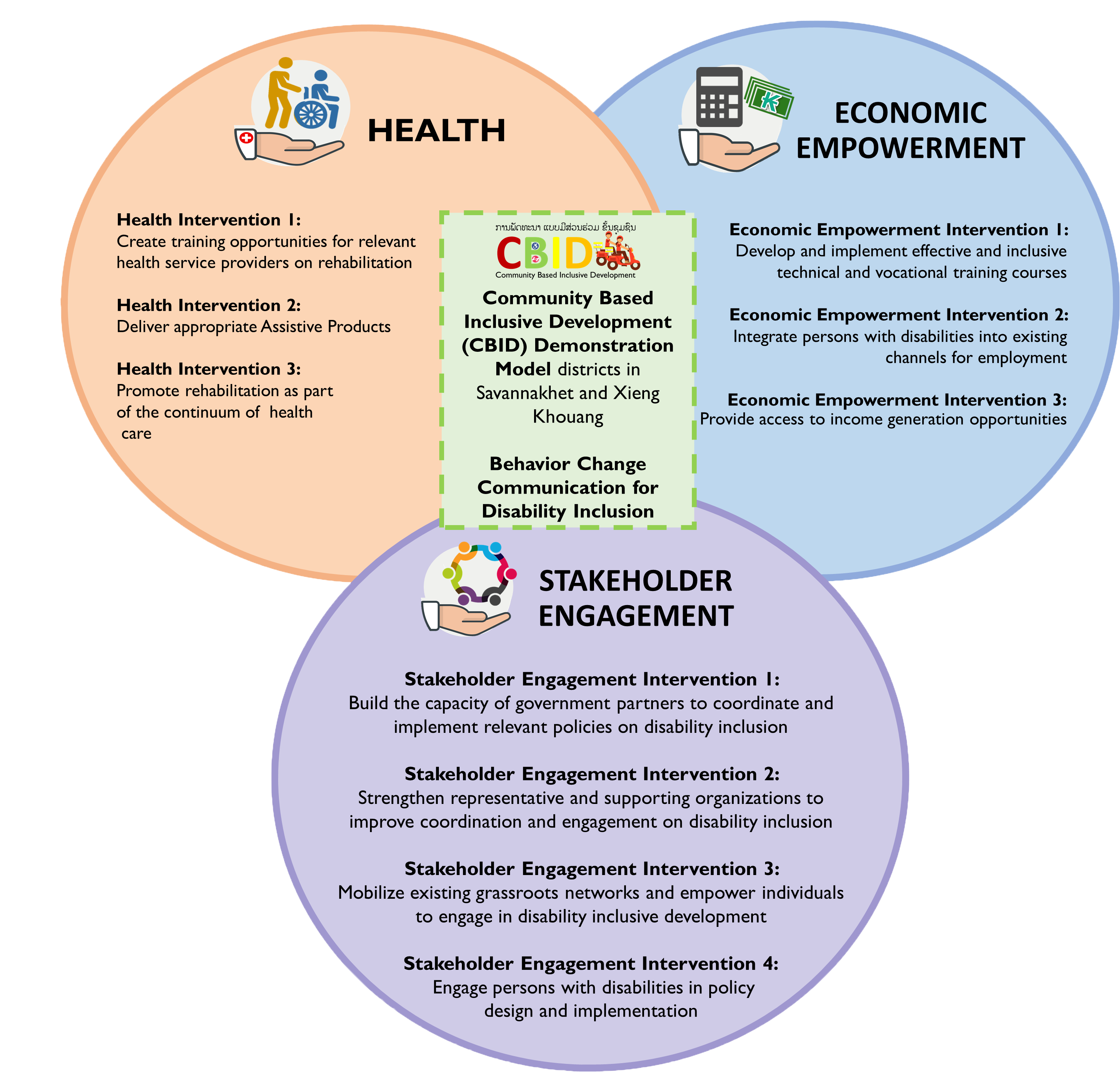“Okard” is the phonetic translation of the word “opportunity” in Lao
USAID Okard is a five-year project that promotes disability inclusive development in Lao PDR. Funded by the U.S. Agency for International Development’s Leahy War Victims Fund and Victims of Torture Program, and the U.S. Department of State, USAID Okard partners with the Lao government and civil society organisations to take tangible actions to remove barrier to inclusion and to empower people with disabilities to optimise and sustain their independent living and functional ability.
The number of persons with disabilities increase significantly due to the rise of traumatic injury (unexploded ordnance (UXO) and road traffic crashes), noncommunicable diseases and aging. Promoting equal access to health, rehabilitation and social services will contribute to enhance full and effective participation or people with disabilities in society on an equal basis with others.

KEY APPROACHES
The U.S. Agency for International Development (USAID) Okard project partners with the public and private sectors to support persons with disabilities in the areas of health, economic empowerment and stakeholder engagement. Okard uses a systems-centered approach focusing on increasing government leadership and ownership of disability inclusion and rehabilitation and mental health policies and strengthening services delivery for long-term sustainability. The project also applies a person-centered approach addressing the individual needs of persons with disabilities and the communities that support them. The project is primarily implemented in Vientiane Capital and in the provinces of Xieng Khouang and Savannakhet.
USAID Okard believes that
IF
the government of Lao PDR increases its leadership and governance to strengthen policies and strategies related to disability inclusion and rehabilitation
AND IF
the government and non-government community actors are equipped and engaged to take tangible actions to effectively remove barriers toward inclusion
AND IF
primary health providers receive training on essential rehabilitation techniques, equipment and supply of simple assistive products
AND IF
people with long-term impairment receive home based case management to increase and sustain their independent living (livelihood) and optimal functional ability
THEN
people with long-term impairment will fully and effectively participate in society on an equal basis with others.
HEALTH
USAID Okard creates training opportunities for health professionals on rehabilitation, increases the delivery of appropriate assistive products and promotes rehabilitation as part of the continuum of healthcare systems. It also supports Mental Health and Psychosocial Support (MHPSS) through training of service providers and peer-counseling.
ECONOMIC EMPOWERMENT
The project engages with a variety of partners including non-profit associations, governmental bodies and the private sector to implement inclusive vocational training courses, integrate persons with disabilities into the labor force and provide market-based livelihood opportunities.
STAKEHOLDER ENGAGEMENT
USAID Okard assists the Ministry of Health and the National Committee for Disabled People and the Elderly to better coordinate organizations and institutions that support PWDs. In addition, the project strengthens disabilities-focused organizations’ engagement with the Government of Laos to advance the rights of PWDs, mobilize grassroots networks and engage PWDs in policy design and implementation.
COMMUNITY BASED INCLUSIVE DEVELOPMENT (CBID)
USAID Okard addresses the individual needs of Persons with Disabilities through community based inclusive development (CBID). Case managers identify Persons with Disabilities and develop a personalized action plan with the family to address specific health, economic and social needs and remove barriers that hinder participation and inclusion in society. Actions could include access to health care to improve function and wellbeing such as rehabilitation, assistive products and psychosocial support, access to income generation and social activities. At the same time, different stakeholders in the community are encouraged to work together to identify solutions and create opportunities for inclusion – mobilizing people and resources through changes in knowledge, attitudes and practices, leading to a sustainable, inclusive community.
IMPACT AND RESULTS
- USAID Okard supported the Government of Lao PDR to disseminate two new key policies; the National Disability Law and the National Rehabilitation Medicine Strategy that will support PWDs to access support, services and benefits.
- USAID Okard supported the Ministry of Health to complete the WHO STARS, an evidence based and standardized situation assessment on the status of rehabilitation, which provided clear recommendations to guide strategic planning on strengthen rehabilitation within the health system.
- USAID Okard lead the creation of accessible Covid-19 information, including the first ever national broadcasts with sign language interpretation, so PWDs could access crucial health information and know how to protect themselves from the coronavirus.
For USAID Okard Fact Sheet available here:

